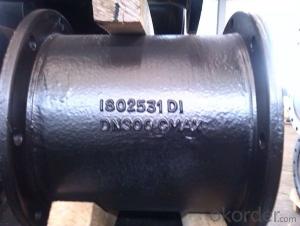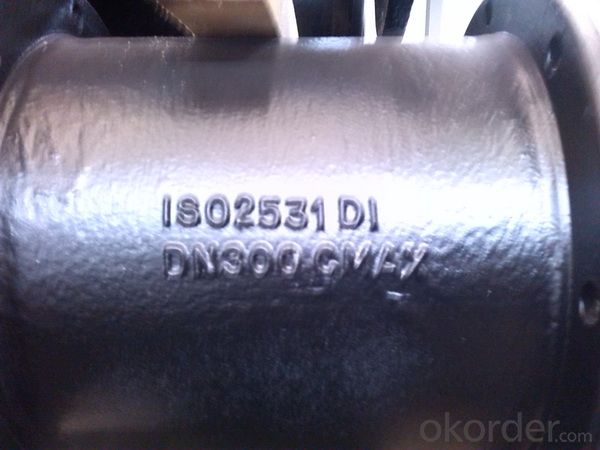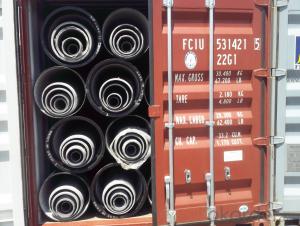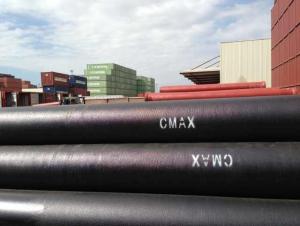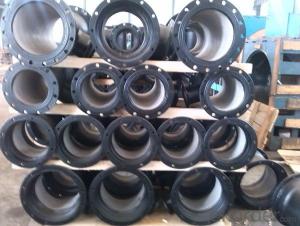DUCTILE IRON PIPE K12 DN 350
- Loading Port:
- Tianjin
- Payment Terms:
- TT OR LC
- Min Order Qty:
- -
- Supply Capability:
- 30000Tons m/month
OKorder Service Pledge
OKorder Financial Service
You Might Also Like
CNBM ductile iron pipe ranges from DN80-DN1600mm (T-Type, Class K9), effective length 6m, comply with ISO2531 Standard
Company Profile
CNBM International Corporation is the leading production base and renowned supplier of Ductile Iron Water Pipe systems of both potable and waste water in China. We are constantly looking to develop high quality products to ensure the longest service life and wonderful performance.
CNBM Pipelines regard quality as the essential factor leading to successful business. Every pipe is tested in accordance with BS EN545 (water application) or BS EN598 (sewer application). CNBM Pipelines products comply with and are tested according to the relevant European and International Standards. Our pipes are manufactured under the quality management system BS EN ISO 9001. After years of efforts, CNBM Pipelines has built up great reputation in terms of quality and service among customers worldwide
Product Introduction
CNBM ductile iron pipe ranges from DN80-DN1600mm (Tyton, T-Type, Class K7/K8/K9), effective length: 6m, complying with BS EN545/EN598/ISO2531/BS4772.
Specification& Payment terms
Internal lining: Pipes shall have an internal cement mortar lining in acc with ISO4179.
External coating: Pipes shall be externally coated with metallic zinc spray plus a further layer of resin painting to ISO8179.
Gasket: 100% SBR/NBR/EPDM gasket in accordance with ISO4633.
Packing: Pipes from DN100 to DN300 be bundled with steel belts, the others are in bulk.
Payment term: By 30% T/T advance payment + 70% Irrevocable L/C at sight.
Packing: In bulk vessel or in container.
- Q: Can ductile iron pipes be used for mining applications?
- Yes, ductile iron pipes can be used for mining applications. Ductile iron pipes are known for their strength, durability, and resistance to corrosion, making them suitable for various industrial purposes, including mining. Their ability to withstand high pressure and handle heavy loads makes them ideal for transporting water, slurry, and other materials commonly used in mining operations. Additionally, ductile iron pipes have a long lifespan, reducing the need for frequent replacements and maintenance in mining environments.
- Q: Can ductile iron pipe be used for bridge crossings?
- Yes, ductile iron pipe can be used for bridge crossings. Ductile iron pipe is known for its strength, durability, and flexibility, making it suitable for various applications, including bridge crossings. Its high tensile strength allows it to withstand heavy loads and vibrations, making it ideal for supporting bridges and handling the weight of traffic. Additionally, ductile iron pipe's flexibility allows it to absorb movements and deformations caused by temperature changes, settling, and other factors, reducing the risk of structural damage and ensuring the longevity of the bridge crossing. Furthermore, ductile iron pipe is resistant to corrosion, making it a reliable choice for bridge crossings where exposure to moisture, chemicals, and other corrosive elements is common. Overall, ductile iron pipe's properties make it a suitable and reliable material for bridge crossings.
- Q: Are ductile iron pipes suitable for road crossings?
- Yes, ductile iron pipes are suitable for road crossings. Ductile iron is a strong and durable material that can withstand heavy loads and traffic. It has high tensile strength and flexibility, making it an ideal choice for underground installations beneath roads. Additionally, ductile iron pipes are resistant to corrosion and have a long lifespan, making them a reliable option for road crossings.
- Q: Can ductile iron pipes be used for conveying gases?
- Yes, ductile iron pipes can be used for conveying gases. Ductile iron has excellent mechanical properties and is resistant to corrosion, making it a suitable material for transporting various types of gases. Additionally, ductile iron pipes are known for their strength and durability, making them a reliable choice for gas transmission systems.
- Q: Are there any specific standards or specifications for ductile iron pipes?
- Ductile iron pipes have specific standards and specifications that must be adhered to. The American Water Works Association (AWWA) and the International Organization for Standardization (ISO) are responsible for establishing the most commonly used standards for these pipes. AWWA has developed the AWWA C151 standard, which covers everything from design and manufacturing to testing, installation, and maintenance requirements for ductile iron pipes used in water and wastewater applications. This standard outlines the materials, dimensions, and mechanical properties of the pipes, as well as the necessary coatings and linings. Similarly, ISO has created the ISO 2531 standard, which provides guidelines for the design, manufacturing, testing, and installation of ductile iron pipes in water and wastewater systems. This standard addresses various aspects, including dimensions, mechanical properties, coatings, and linings. In addition to these well-known standards, there may be other regional or national standards that are specific to certain countries or regions. These standards typically align with the AWWA and ISO standards or may have additional requirements that are specific to local conditions or regulations. Compliance with these standards ensures that ductile iron pipes meet the required quality and performance standards. It also promotes the interoperability and compatibility of ductile iron pipes across different systems and countries, which in turn enables reliable and efficient water distribution and wastewater management.
- Q: How is ductile iron pipe protected against external corrosion?
- To ensure the durability and longevity of ductile iron pipe, various methods are employed to protect it from external corrosion. One commonly used method is the application of protective coatings. Typically, a layer of zinc or asphaltic material is applied to the pipe, creating a barrier between the iron and the surrounding environment. This coating prevents direct contact between the pipe and corrosive elements like soil, moisture, and chemicals, thereby reducing the risk of corrosion. Another layer of protection is provided by wrapping the ductile iron pipe with polyethylene or polypropylene tape. This tape acts as a physical barrier, shielding the pipe from moisture and other potentially corrosive substances. Great care is taken during the application process to ensure complete coverage and adherence to the pipe's surface. Cathodic protection is also commonly used to safeguard ductile iron pipes from external corrosion. This technique involves installing sacrificial anodes or impressed current systems near the pipe. These anodes generate a protective electrical current that counteracts the corrosion process, effectively inhibiting the deterioration of the pipe's surface. Proper installation practices also play a crucial role in preventing external corrosion. It is important to bury the pipe at an appropriate depth, ensuring adequate soil coverage. This minimizes exposure to corrosive elements and maintains the integrity of the protective coatings. Additionally, using corrosion-resistant bedding materials and employing proper backfilling techniques can further enhance the pipe's resistance to external corrosion. In conclusion, a combination of protective coatings, tape wrapping, cathodic protection systems, and proper installation practices ensures the protection of ductile iron pipe against external corrosion. These measures work together to provide a strong defense against corrosive forces, ensuring the pipe's reliability and longevity in various applications.
- Q: How do ductile iron pipes perform in high-temperature steam applications?
- Ductile iron pipes perform well in high-temperature steam applications due to their excellent heat resistance and mechanical strength. They have the ability to withstand the high temperatures and pressures typically found in steam systems without experiencing significant deformation or failure. Additionally, their corrosion resistance properties make them a reliable choice for such applications.
- Q: What are the differences between cast iron pipes W and A?
- Type W: combination of both advantages of the connection type A interface has the advantages of high strength and convenient installation, because of the use of W type straight pipe and reduces the material cost and can be coupled with the design structure of the B type pipe is more compact than the A type pipe, saving installation space.
- Q: What is the expected external protection system for ductile iron pipes?
- The expected external protection system for ductile iron pipes typically involves a combination of protective coatings and cathodic protection.
- Q: What is the typical lifespan of ductile iron pipes?
- The lifespan of ductile iron pipes can differ based on multiple factors, including pipe quality, environmental conditions, and maintenance practices. On average, these pipes typically last approximately 75 to 100 years. This longevity establishes them as a sturdy and enduring choice for water and sewage transport systems. Through correct installation and consistent upkeep, these pipes can endure corrosion, pressure, and other external elements, guaranteeing their durability and dependability. Furthermore, advancements in coatings and linings have extended the lifespan of ductile iron pipes, making them an exceptional option for infrastructure projects.
Send your message to us
DUCTILE IRON PIPE K12 DN 350
- Loading Port:
- Tianjin
- Payment Terms:
- TT OR LC
- Min Order Qty:
- -
- Supply Capability:
- 30000Tons m/month
OKorder Service Pledge
OKorder Financial Service
Similar products
Hot products
Hot Searches
Related keywords
